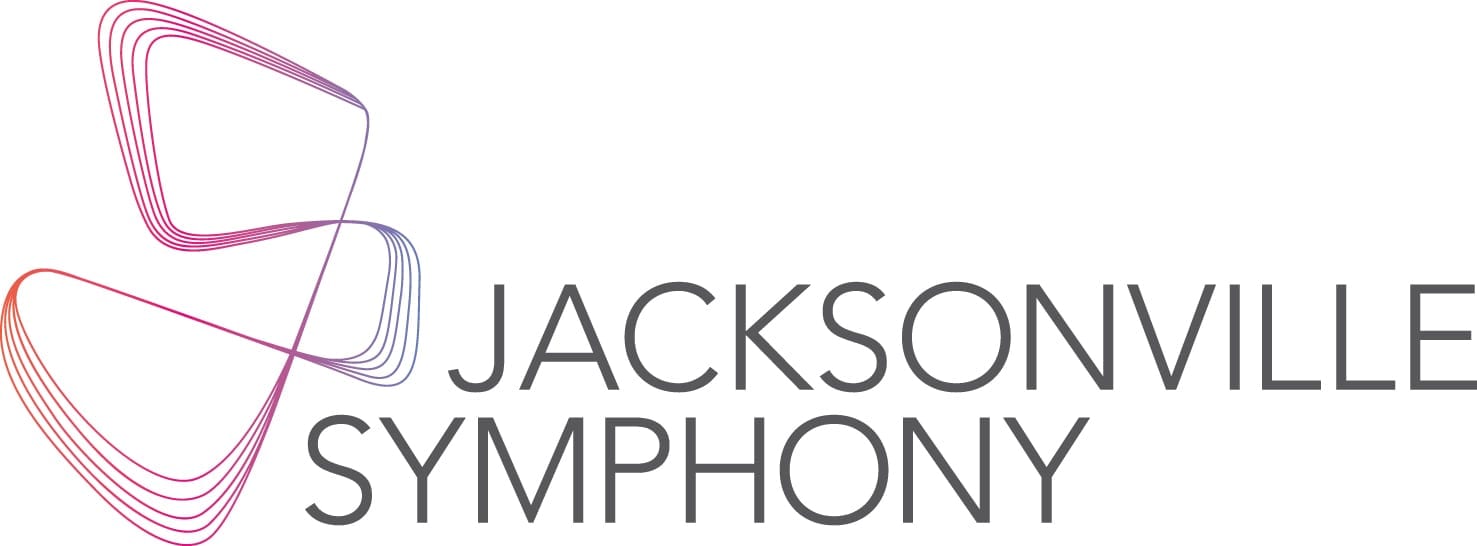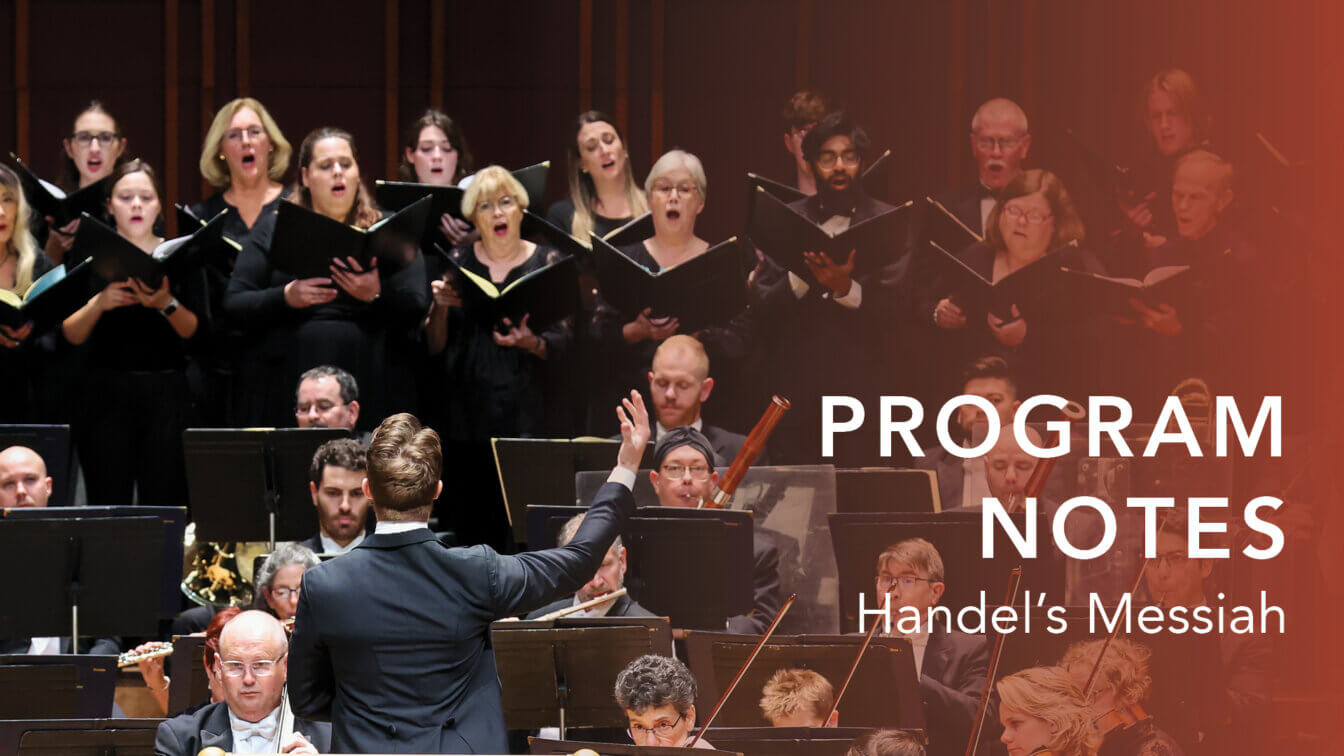Program Notes: Handel’s Messiah
George Frideric Handel’s Messiah:
World Premiere April 13, 1742; Dublin, Ireland (150 minutes)
George Frideric Handel’s Messiah holds a universal appeal not only because we associate it with the holiday season but also because Handel’s lovely arias and bubbling choruses do indeed lift us up. They are, collectively, a cause for celebration. The joining together of such large performing forces, a modern phenomenon that would have amazed Handel, with unfailingly enthusiastic audiences, is among the most joyous celebrations in our society.
Attending a performance of Messiah is a bit like going to a large family reunion. All around you are friendly relatives you haven’t seen in a year or more. Each of them has something interesting to tell you, and when groups of them congregate in different conversations, the atmosphere is even more lively. Virtually every emotion is present at such a large gathering: sorrow is tempered by joy, anger by happiness and bereavement by renewal. The lasting feeling is one of love and comfort at the familiarity of one’s companions who become friends as well as relatives.
Taking a look at the creation of this masterpiece, Handel was born the same year as Bach, but he lived a far more cosmopolitan life than his peer. Early in his career, he worked in Italy where he mastered all types of vocal music, including opera. After settling in England, he continued writing Italian opera. In the late 1720s, he shifted his focus to sacred oratorios on Biblical texts. Messiah is the crown jewel among them. Handel composed it in only 24 days from late August to mid-September 1741 in London. The premiere took place in Dublin, Ireland, on April 13, 1742, and the oratorio rapidly worked its way into the English repertoire.
Handel’s librettist, Charles Jennens, selected his texts primarily from the Prayer Book, also drawing on the Book of Isaiah and the Gospels. Far from being exclusively Christmas-season texts, Jennens’ words also have relevance to Easter, Ascension and Whitsun.
To Messiah also belongs the most famous and revered tradition in all choral music: the audience rising to stand at the conclusion of Handel’s Part II for the “Hallelujah” chorus. Overall, to the chorister, whether in a formal performing ensemble or in an audience participating from a seat in the hall, here is music that speaks to the spirit in the most warm and communicative of ways. This is music that is fun, albeit very demanding, to sing. For those moments of participatory repose between choruses, Handel provides a wealth of glorious solo music for our enjoyment, including some recitatives as moving as any operatic example. “Then shall the eyes of the blind be open’d” (preceding “He Shall Feed His Flock/Come Unto Him”) and “Thy rebuke hath broken his Heart” (leading to “Behold, and See if there be any Sorrow”) come immediately to mind.
Among the other favorite relatives, we are delighted to re-encounter in this rich family of arias, recitatives, orchestral interludes and choruses the tenor arias “Comfort Ye” and “Ev’ry Valley Shall be Exalted;” soprano arias “Rejoice Greatly” and “I Know that my Redeemer Liveth;” the bass aria “The Trumpet Shall Sound;” and the incomparable contralto solo “He was despised.” With the latter is associated a wonderful story that epitomizes the spirit of Messiah.
Singers and instrumentalists alike take great pride in the faithful execution of this immortal score. Nearly three centuries later, his music is still capable of uplifting us and infusing incredible joy into the holiday season.
Messiah
George Frideric Handel
Born February 23, 1685, in Halle, Germany | Died April 14, 1759, in London, England
An Ambitious Composer Builds His International Resume
George Frideric Handel was born in Germany, educated in Germany and Italy and spent nearly all of his mature career in Italy and England. The last became his eventual adopted home. He must be counted among the most international of composers, and he was also a pragmatist. Recognizing as a young man that his future success lay in the mastery of Italian opera, he betook himself to Florence in 1706 at the invitation of Prince Ferdinando de’ Medici. While he lived and worked in Italy, his path crossed that of both Alessandro and Domenico Scarlatti, Antonio Vivaldi, Tomaso Albinoni, Antonio Caldara and Arcangelo Corelli. During his Italian years, he developed a mastery of all types of vocal music, including opera, oratorio, chamber cantata and important instrumental forms like the concerto and the sonata.
When Handel left Italy in 1710 for Hanover, Germany, and, eventually, England, he was a highly accomplished composer and a superb organist. Initially, he made his reputation in London through Italian opera, but by the late 1720s, English taste was changing. The highly successful run of John Gay’s The Beggar’s Opera (1728) precipitated a revolution of sorts in popular taste. English audiences wanted their musical entertainment in English, and the future of Italian opera in London looked grim.
Shift from Italian Secular Opera to English Sacred Oratorio
The necessary adjustment prompted Handel to turn his energies to a series of sacred oratorios on primarily Old Testament texts. These date primarily from the 1730s until Handel’s death in 1759, and Messiah is the crown jewel among them. While its first London performance in 1743 received an indifferent reception, Handel had the satisfaction of witnessing a change of fortune for the work during his lifetime. After 1750, when a performance was presented in London to benefit a Foundling Hospital, Messiah became an annual event, a tradition that has grown to remarkable proportions in many countries besides England.
A Libretto for All Seasons from Christmas to Whitsuntide
As previously noted, Handel’s librettist for Messiah was Charles Jennens, a wealthy Englishman with whom Handel had collaborated on the 1738 oratorio Saul. He selected his texts primarily from the Prayer Book, also drawing on the Book of Isaiah and the Gospels. As Nicholas Kenyon has observed:
“Messiah is an oratorio which celebrates the whole of Christ’s work, from its anticipation in the prophecy of the Old Testament, through his life, suffering, death and Resurrection, to his future second coming in glory.”
No small order for a composer, that, but Handel was equipped for the task. Winton Dean, in The New Grove Dictionary of Music and Musicians, has admirably summarized some elements of what makes Messiah so special.
“The greatness of Messiah – Handel’s only sacred oratorio in the true sense and therefore untypical – derives on one level from its unique fusion of the traditions of Italian opera, English anthem and German passion, and on another from the coincidence of Handel’s personal faith and creative genius to express, more fully than in any other work of art, the deepest aspirations of the Anglican religious spirit.”
A Woman of Questionable Repute: Redemption Through Artistry
On the occasion of the first performance in Dublin, Ireland, on April 13, 1742, the contralto soloist was the English singer and actress Susanna Maria Cibber, sister of the composer Thomas Arne. Her elopement with her lover, John Sloper, several years previously, had precipitated a scandalous lawsuit that prompted her to retire from public appearances for three years, choosing to reside quietly in the Berkshire countryside with Sloper. She traveled to Dublin in 1741 for a single season at the Aungier Street Theatre. Travel was slow in the mid-18th century, but gossip, as always, made its way rapidly, and Mrs. Cibber’s (by which name she remained known) muddied reputation preceded her.
When Handel arrived in Dublin with his entourage to prepare for the premiere of Messiah, he contracted with her to perform as one of his soloists. His decision, though it might have been questionable from the standpoint of public opinion, was artistically sound. So sweet was her singing, and so transporting her interpretation, that a distinguished member of that first audience, Reverend Dr. Delany, was moved to rise from his seat and exclaim: “Woman, for this, be all thy sins forgiven!”
While no such drama is expected from modern audiences, nearly three centuries after that first performance, Handel’s music still transports us to a higher plane.
Instrumentation: In its original orchestration, Messiah was scored for strings and continuo and solo trumpet for the obbligato aria “The Trumpet Shall Sound.” For the London performances in 1743, Handel added oboes and bassoons, doubling the strings during the choruses. Today, Messiah is generally performed with oboes, bassoons, trumpets, timpani, strings, harpsichord and organ continuo, vocal soloists and mixed chorus.
Program Notes by Laurie Shulman ©2023


